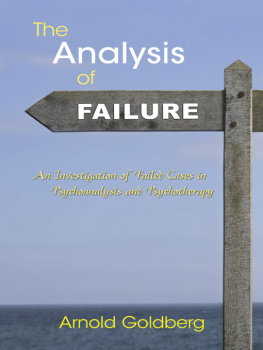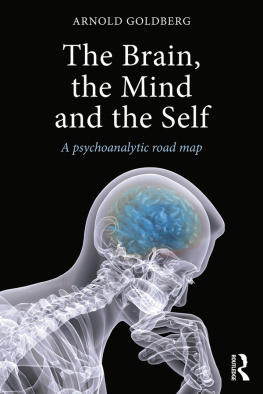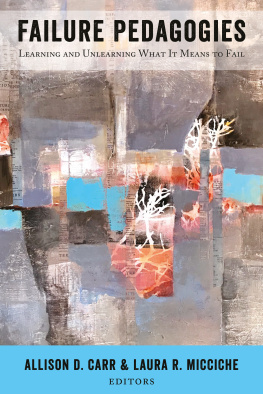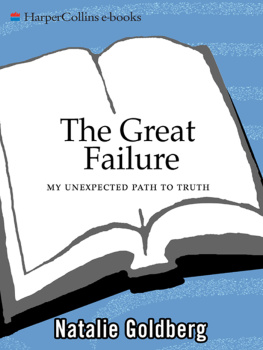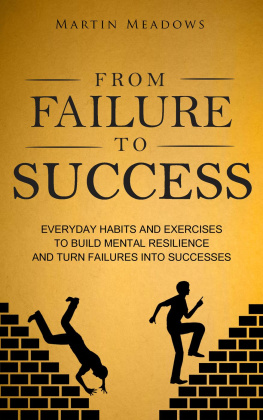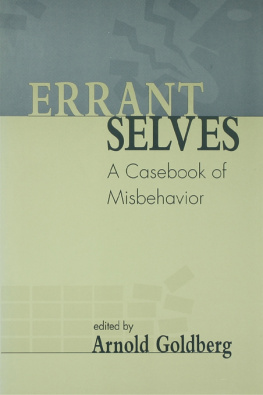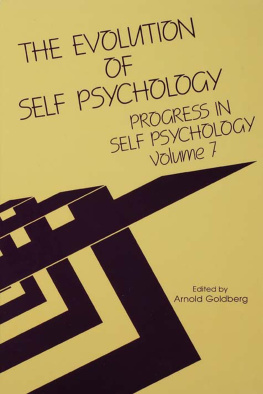The Analysis
of FAILURE
The Analysis
of FAILURE
An Investigation of Failed Cases in
Psychoanalysis and Psychotherapy
Arnold Goldberg
Routledge | Routledge |
Taylor & Francis Group | Taylor & Francis Group |
711 Third Avenue | 27 Church Road |
New York, NY 10017 | Hove, East Sussex BN3 2FA |
2012 by Taylor and Francis Group, LLC
Routledge is an imprint of Taylor & Francis Group, an Informa business
Printed in the United States of America on acid-free paper
10 9 8 7 6 5 4 3 2 1
International Standard Book Number: 978-0-415-89302-2 (Hardback) 978-0-415-89303-9 (Paperback)
For permission to photocopy or use material electronically from this work, please access www.copyright.com (http://www.copyright.com/) or contact the Copyright Clearance Center, Inc. (CCC), 222 Rosewood Drive, Danvers, MA 01923, 978-750-8400. CCC is a not-for-profit organization that provides licenses and registration for a variety of users. For organizations that have been granted a photocopy license by the CCC, a separate system of payment has been arranged.
Trademark notice: Product or corporate names may be trademarks or registered trademarks, and are used only for identification and explanation without intent to infringe.
Library of Congress Cataloging in Publication Data
Goldberg, Arnold, 1929
The analysis of failure : an investigation of failed cases in psychoanalysis and
psychotherapy / Arnold I. Goldberg.
p. cm.
Includes bibliographical references and index.
ISBN 978-0-415-89302-2 (hbk. : alk. paper) -- ISBN 978-0-415-89303-9 (pbk.:
alk. paper) -- ISBN 978-0-203-81710-0 (e-book)
1. Psychotherapy--Evaluation. 2. Psychoanalysis--Evaluation. 3.
Psychotherapist and patient. I. Title.
RC480.5.G583 2012
616.8914--dc222011008125
Visit the Taylor & Francis Web site at
http://www.taylorandfrancis.com
and the Routledge Web site at
http://www.routledgementalhealth.com
To Connie, Sarah, and Andrew
Contents
| Chapter 1 |
| Chapter 2 |
| Chapter 3 |
| Chapter 4 |
| Chapter 5 |
| Chapter 6 |
| Chapter 7 |
| Chapter 8 |
| Chapter 9 |
| Chapter 10 |
| Chapter 11 |
| Chapter 12 |
| Chapter 13 |
| Chapter 14 |
| Chapter 15 |
| Chapter 16 |
Acknowledgments
T his book grew out of a seminar at the Institute for Psychoanalysis of Chicago on failed cases. I am grateful to the analysts and analytic candidates and others who attended the seminar and especially to those who remained with us throughout its entire existence. I am especially indebted to those who volunteered to present their cases of failure to our seminar. I wish I could list all the names of the attendees and presenters, but it is probably prudent for them to remain confidential. The patients mentioned in the book have all been disguised or are composite patients that were constructed from a wide number of sources, so confidentiality prohibits much more than an overall message of gratitude. Finally, I am surprised to realize that I am also grateful to those who were too reluctant and/or frightened to present and so came up with a variety of excuses. They allowed for a better understanding of what failure means to us and does to us all. I hope the reader shares in my gratitude.
Thanks to Dr. William Scheftner, chair of the Department of Psychiatry at Rush University Medical Center, and the Michael Franz Basch Research Fund for financial support; to Denise Duval and Dennis Shelby for their help with the statistics; and to my secretary Christine Susman.
1
Introducing Failure
Whos the Greatest?
A friend once told me that, although he was an outstanding violinist, he had decided to pursue a career in medicine rather than the promise of a concert career when he realized that he would never be one of the worlds five or ten greatest violinists. So, too, had a brilliant PhD in philosophy decided to become a psychologist because, in her words, there was only one Kant. There are surely a number of reasons for a hope for fulfillment in one field of endeavor becoming diverted or compromised, but a good number of these changes in direction do involve a modification or a redeployment of what many psychoanalysts consider to be a driving force of ambition: a grandiose fantasy. First explained, developed, and investigated by Heinz Kohut, the attribution of feelings of specialness and greatness was examined in the infantile exhibitionism and associated responsiveness of mirroring in the caretaking mother (Kohut, 1971). The later expression of this infantile grandiosity was noted in flying fantasies along with the concomitant excitement of such a psychological display.
If one follows the progress of infantile grandiosity, it is usually manifested in a variety of displays of exhibitionism and personal specialness along with its beginning transformation into the more or less acceptable forms of personal ambition. Although it may be felt that the grandiose exhibitionistic fantasies of infancy are universal, the ultimate fate of these central forces is both complex and problematic. Initially one might feel the possibilities for the eventual resting place for grandiose fantasies are infinite, but it may well be possible to study the varieties of deployment of a personal feeling of importance, significance, and even greatness.
From the complete repression of the aforementioned fantasy, to the preconscious and even conscious suppression of it, to the more open and even naked display of the derivatives of grandiosity and ambition, it may be equally plausible to correlate some developmental experience to the later expression of the alterations and modifications of this fantasy that is enjoyed by some and despised by others. Everything from birth order to all of the vicissitudes of early childhood becomes relevant to the emergence and persistence of the derivatives and alterations of ones exhibitionism and grandiosity. Perhaps no more common and recognizable than any is the rescue fantasy.
From the Lone Ranger to Superman, our childhood heroes are those who rescue and save the unfortunate. Whether those needing rescue are miners trapped underground or last-minute, coming-from-behind, winning athletic teams, we are uniformly excited by the rescue process. Just as blatant exhibitionism or naked ambition is to be shunned and condemned, rescues are uniformly admirable. Indeed, often the ideal hero is one who is humble in the midst of applause. Our society makes a virtue of this particular derivative of the wish to be great, and there is no more poignant image than that of the person rushing into a burning building to save a child while oblivious to his or her own personal danger. And so, not surprisingly, there is no more painful tale than that of a rescue that falls on its face. Failure lurks in the shadows of every rescue attempt, and the fantasy that accompanies every rescue is haunted by the ease in which it may lead to jeers instead of cheers.
It is no surprise to realize our recognition of the essence of failure as the destruction of our need to rescue and to achieve fulfillment of our earliest wish for admiration. We hate failure not only for the obvious but also for what it does to our self-esteem. It is probably not far afield to conclude that our violinist and philosopher managed to channel their wish to be the greatest into a life of rescuing.

